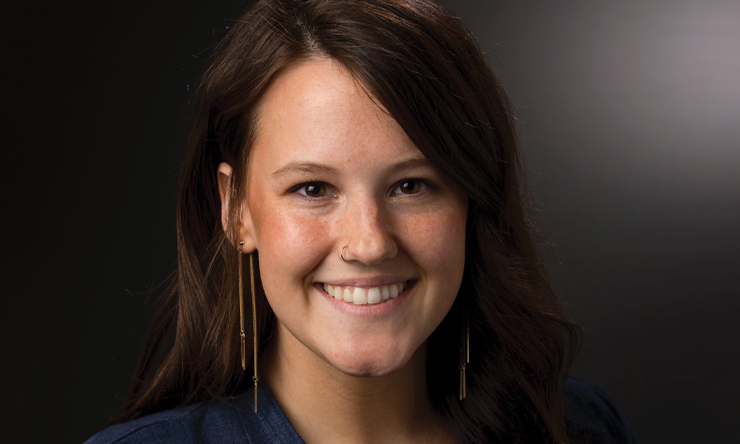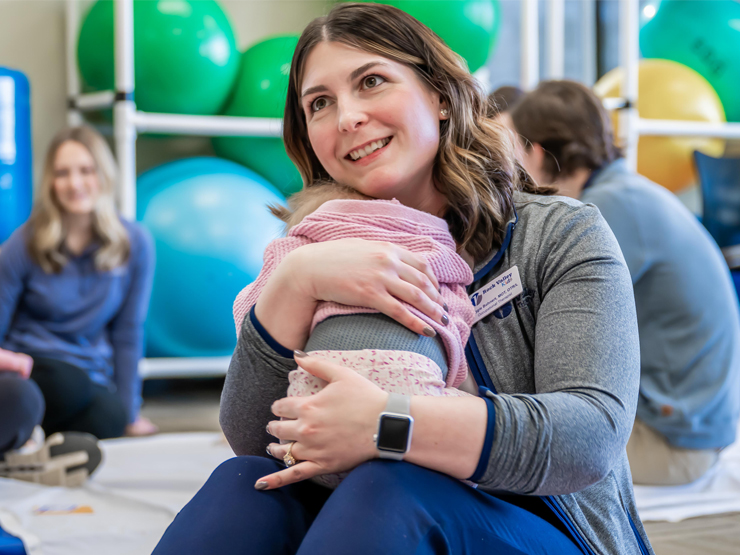Tom Higgins remembers the mid-1960s as "a time of great foment." The Civil Rights Movement was fully underway and college campuses nationwide were wrestling with the divisive issue of American involvement in the conflict in Vietnam.
As a small, private, Catholic school grounded in the Liberal Arts and steeped in a long history of peace and social justice, St. Ambrose most certainly was not immune to such "foment."
And as a political science major who had spent two previous years in a seminary near his hometown of Springfield, Illinois, Higgins was a young man unable to stand on the sidelines of history.
Within nine months of his arrival on campus, Higgins was president of the Student Government Association, active in the growing anti-war movement on campus, and, thus, frequently engaged in a dialogue with the president of what was then St. Ambrose College, Msgr. Sebastian Menke.
"I was challenging and pushing," recalled Higgins, who was not alone in confronting a campus administration that, rightly or wrongly, represented authority to students wired to challenge it.
Afflict the comfortable. You know?
A Little History
Tom Higgins (left) on Msgr. Sebastian Menke: "I will never forget how warm and generous and supportive he was. It was a courageous thing for him to do, and, at the time, very far-sighted. He was very Ambrosian, very dedicated to social justice and public health."
Even in that difficult moment, however, Higgins said Msgr. Menke was considerably more Ambrosian than adversarial. "He handled it in an impressive way, as a wise and understanding person willing to help the school and its student body work through change," Higgins said.
A few years beyond his 1967 graduation, Higgins came to understand even more deeply Msgr. Menke's capacity for wisdom and understanding.
Higgins was recruited in 1971 to help launch a treatment center and rehabilitation clinic for the growing problem of substance addiction in the Quad Cities. In that role, he set off in search of vital funding for a cause that was not viewed as sympathetic in every corner of the community.
Yet, when he met with the presiding chair of the United Way of the Quad Cities, Higgins found someone willing to assist without judgment.
That someone, of course, was Msgr. Sebastian Menke, who readily approved a grant that provided seed money for an organization that today continues to assist Quad Citians challenged by addiction.
Comfort the afflicted. You know?
"I will never forget how warm and generous and supportive he was," Higgins recalled. "It was a courageous thing for him to do, and, at the time, very far-sighted. He was very Ambrosian, very dedicated to social justice and public health."
Thankfully, that would not be the last time Tom Higgins' values would align closely with those of his alma mater, and together he and St. Ambrose would step up to address another pressing health care need.
***
The emerging concept of person-centered care can empower individuals and their families to direct the work of integrated, inter-professional teams of health and human service providers in order to best serve the patient's wants, nee, s and values.
The Institute for Person-Centered Care (IPCC) at St. Ambrose will collaborate with regional health systems, other non-profit community health organizations and healthcare and social work professionals throughout the Quad Cities to advance that mission.
The Institute was introduced in October along with a Master of Public Health degree program that will enroll its first class in August 2018.
Both initiatives will be funded in part by a $1 million gift from Tom Higgins.
Throughout an eclectic and successful entrepreneurial career, Higgins has maintained a passion for improving a healthcare system bogged down by challenges he first began to understand while launching that clinic at the base of Davenport's Harrison Street hill.
The IPCC brings Higgins' mission nearly full circle and aligns his long-held interest in re-imagining healthcare and social services with his alma mater's growing reputation as a premier provider of health and human services education.
'I think St. Ambrose is big enough that we can punch above our weight but, at the same time, we are sort of the right size. It's pretty hard to avoid talking to each other, and I hope these additions make it even easier.'
Tom Higgins '67
As a member of the SAU Board of Trustees since 2008, Higgins has watched St. Ambrose open the state-of-the-art Center for Health Sciences Education at Genesis and add master's degree programs in speech-language pathology, physician assistant studies and exercise physiology. These joined existing programs, with burgeoning reputations, in nursing, physical therapy, occupational therapy and social work.
He believes the two new complementary initiatives, the and the MPH, will help his alma mater further build on those existing assets and position the University as a "thought leader" in a global effort to transform health care.
"We are working with strengths we begin with - elements of the University where we have established credibility and excellence," he said. "Now, we're seeking to integrate those elements to make a really positive contribution to a reform of healthcare delivery.
"This is an opportunity to create a brand identity for the College of Health and Human Services that is illustrative of real regional leadership."
The Institute for Person-Centered Care at St. Ambrose will be the first of its kind in the Midwest and among the first in the nation. It will partner with Genesis Health System and UnityPoint Health-Trinity, two of the largest health networks in Illinois and Iowa, while also working with healthcare and social work professionals from across the bi-state region. Community coalitions like the Quad City Health Initiative will be essential Institute partners as well.
***
THE IPCC mission will be to provide continuing education, support and leadership in search of person-centered models of care.
"At the core of this plan is the commitment to improve the lives of people through a comprehensive program focused not just on the quality of their health but on their overall quality of life as well," noted Rick Seidler, president and CEO for UnityPoint Health-Trinity.
An opening step in the process will be an IPCC-hosted conference in May featuring experts from across the country, convened to examine person-centered care from a global perspective.
"This institute will be a national leader in helping healthcare focus on treating the ‘whole person,'" said Doug Cropper, president and CEO of Genesis Health System.
Inter-professional teamwork already is a prime piece of SAU's curricular approach to health sciences education. That is why Sandra Cassady, PhD, CHHS dean and SAU's vice president for strategic initiatives, believes the IPCC is a perfect fit for those programs - and vice-versa.
Since spring 2016, the Interprofessional Health Clinic and Interprofessional Rehabilitation Clinics at St. Ambrose have been collaboratively staffed by students in physical therapy, occupational therapy, speech-language pathology and social work. Each clinic provides pro-bono care to community members without health insurance or whose benefits for such treatments have been exhausted.
In addition, SAU program directors and faculty have created case-based courses and practical learning experiences that bring together students from different programs to learn how to work as inter-professional teams.
Higgins wonders if larger schools could foster the kind of interaction and collaboration that come naturally to St. Ambrose.
"It is a rebuttable presumption," he conceded, "but I know enough about large organizations to know it gets very, very difficult. You get the silo mentality. A lot of turf consciousness. A lot of town-and-gown stuff. I think St. Ambrose is big enough that we can punch above our weight but, at the same time, we are sort of the right size. It's pretty hard to avoid talking to each other, and I hope these additions make it even easier."
***
The synergy is enhanced by the fit between the IPCC's mission to create a healthcare and social service system more responsive to individual values and St. Ambrose's long-held missions to aid the underserved and promote social justice.
Comfort the afflicted. You know?
"While we were somewhat familiar with the concept of person-centered care when Tom first proposed this institute, our knowledge wasn't nearly as complete as his," said Paul Koch, PhD, the SAU provost and vice president for academic and student affairs who worked closely with Higgins and Cassady to develop both the IPCC and the MPH program. "As Tom helped us become more familiar, we could see how well this fits with our mission of enriching lives."
Sister Joan Lescinski, CSJ, PhD, president of St. Ambrose, said the opportunity to work closely with leading healthcare institutions and professionals in the area also aligns well with the university's commitment to being of the community as well as in it.
"We are privileged to have such an innovative and generous person as Tom so committed to St. Ambrose," she said. "His willingness to bring his resources and vision to our growing health and human services programs presents a wonderful opportunity for St. Ambrose to have a positive impact on the wider community while preparing future healthcare industry leaders."
For Higgins, giving back and striving to build a better community are values that resonate from his years as a St. Ambrose student - as well as to those never-forgotten interactions with Msgr. Menke.
"Obviously, I care deeply about this University and its well being, but I also think the University can be a crucial player in this," he said. "Somebody else could do this I suppose, but what a shame that would be in the sense of a lost opportunity. This is a place where St. Ambrose can really shine. We've got the people. We have the vision and the mission, and, I would argue, we have the good will to bring all these various pieces together and make something of it."
— By Craig DeVrieze '16 MOL
Share This Story




